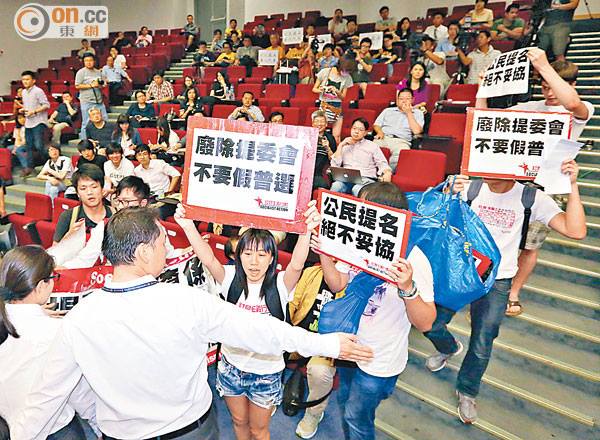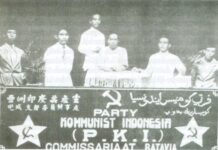Socialist Action refuses money from business or government agencies – our support comes from ordinary people
From Socialist Magazine, issue 30
The issue of funding for political parties and NGOs has become a big issue. During the ‘Umbrella Revolution’ the pro-government camp railed against “foreign meddling” in Hong Kong’s affairs. Yet as most people know, Hong Kong’s wealthiest political party is the Democratic Alliance for the Betterment and Progress of Hong Kong (DAB), which is backed by the deep pockets of the Chinese Communist Party (CCP) regime. One study of the 2011 District Council elections estimated that the DAB spent HK$376 for every vote it received – 282,000 votes in total. Money from CCP sources pays for the “spontaneous” mobilisations of blue ribbons and other groups claiming to speak for the “silent majority”.
While the “colour revolution” propaganda of the CCP has no basis in truth, US government funding for some NGOs and democracy groups is significant, while having nothing to do with promoting “democracy” . The fundamentally anti-democratic role of the US state is shown by the revelations of Edward Snowdon and the recent US Senate report on the CIA’s use of torture.
The National Endowment for Democracy (NED), a US government-funded body, dispersed HK$5.4 billion in 2013 to various Hong Kong groups to promote “democracy”. Ironically, as revealed in the South China Morning Post (28 November), even DAB officials have taken part in “democracy training” workshops paid for by the NDI, which is another wing of the NED. This fact says a lot about the US government view of “democracy”. Conspicuously, the NED does not fund any organisations in Saudi Arabia – one of the world’s most repugnant dictatorships – which just happens to be an important US ally. The same its true of many other US-friendly regimes.
Socialist Action: finance from the grassroots
“We won’t accept any corporate or government funding – not from China or the US!” says Sally Tang Mei-ching of Socialist Action. “We want to build a new fighting democracy movement with a mass working class political party at its the core. This also means our attitude to raising money is different. We raise money from grassroots supporters and through spreading a socialist magazine.”
Jimmy Lai Chee-ying and the pan democrats
Jimmy Lai Chee-ying’s donations to pan democratic parties (reportedly HK$10 million in 2013) reflect his own political agenda – to promote the ‘moderate’ wing of the pan-democratic bloc at a time when it has been increasingly discredited. Apple Daily began campaigning from the fourth week of the ‘Umbrella Revolution’ for the occupations to end. In 2010, Lai’s media mouthpieces supported the Democratic Party’s line against the ‘five districts referendum’ and for negotiations with the CCP. Through his media empire and money bags, Lai is able to exercise an exaggerated and undemocratic influence on the struggle.
DAB: Selling fake art?
The DAB received a total of HK$107 million in 2013, of which around HK$60 million came from “dinner fundraisers”. DAB fundraising dinners are attended by top officials from both sides of the border, from CY Leung to Liaison Office chief Zhang Xiaoming. Tycoons like Pansy Ho (daughter of Macau casino mogul Stanley Ho) and mainland property tycoon Xu Rongmao have donated millions to the DAB through buying questionable “artworks”.
Should HKCTU accept US funding?
The Hong Kong Confederation of Trade Unions (HKCTU) has admitted receiving around HK$600,000 per year for the past seven years from the Solidarity Centre, tied to the US union federation AFL-CIO, which in fact serves as another conduit for US government funding (over half the Solidarity Centre’s funding comes from the NED). The Solidarity Centre has been widely criticised as an arm of US foreign policy, especially in Latin America where it has supported efforts to destabilise regimes the US disfavours. The Solidarity Centre’s predecessor, the American Institute for Free Labor Development (AIFLD), supported military coups against presidents Jacobo Arbenz in Guatemala in 1954 and Salvadore Allende in Chile in 1973. More recently, in Venezuela it funds the anti-government CTV, a right-wing union federation that played an active part in the failed coup against left-wing president Hugo Chavez in 2002. HKCTU members have every right – as many US unionists are already doing – to question why their organisation accepts such funding.
Civic Passion – who pays?
Nativist grouping Civic Passion has long waged a hate campaign against Socialist Action over our magazine sales. This group, which many suspect is just an electoral stage to get Wong Yeung-tat into the Legco, is largely silent on where its own funds come from. It reports a budget of HK$1.2 million in the past year.
What about NGOs?
There are over 30,000 NGOs in Hong Kong, an increase from 8,700 at the time of the handover. Many are in reality not “non-government” as they receive funding from governments or religious agencies. NGOs exercise a great deal of influence on almost every social and political movement in Hong Kong. Yet these are mostly closed groupings with a business-like structure rather than with a mass democratic base.
Many NGOs play a useful role in compiling important data and exposing injustices. The problems, however, begin when these organisations capture a leading role in mass movements – such as the Umbrella Movement where several NGOs sat in the “United Front” leadership. The narrow ‘single-issue’ outlook of most NGOs, and their dependence on funds from powerful sponsors, means they act as a conservative brake on mass protest movements and seek to “keep politics out”.




